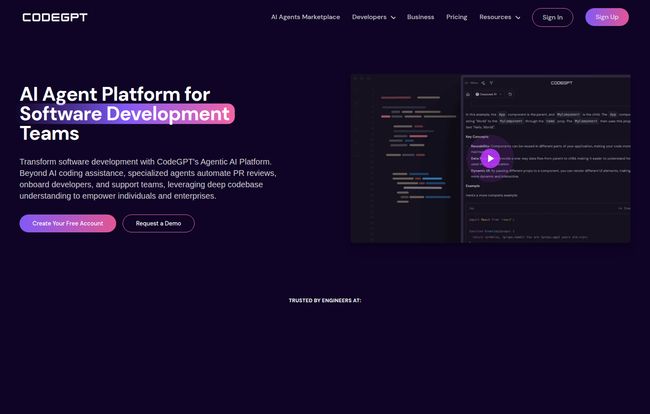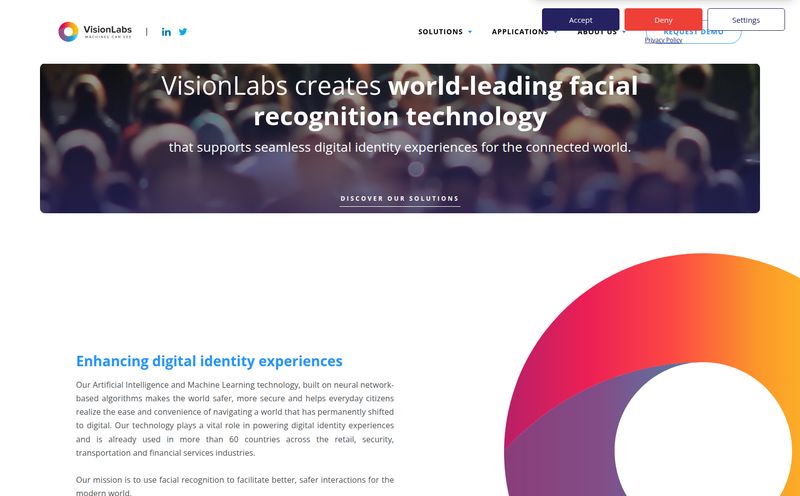If you're a developer in this day and age, you're probably already buddies with an AI coding assistant. We've all been living in the GitHub Copilot world for a while now, and yeah, it’s pretty great. It saves time, writes boilerplate I'd rather not, and occasionally pulls a rabbit out of a hat with a function I was dreading to write. It's a fantastic autocomplete on steroids.
But I’ve been feeling a ceiling. A limit to what it can do. It's a great pair programmer, but it's still just that—a pair. It doesn’t really understand the entire project, the intricate web of dependencies, or the architectural decisions made six months ago. It helps me write code, but it doesn’t help me manage the process of coding.
Then I stumbled upon CodeGPT. And I gotta say, it feels different. Not just an incremental improvement, but a genuine shift in what an AI tool for developers can be. This isn't just a copilot. It's a platform of AI agents.
So, What is CodeGPT, Really?
I know what you're thinking. "Another AI coding tool?" I was skeptical too. But the key word here is Agent. Most AI assistants we use are reactive; we ask, they answer. They have the memory of a goldfish, limited to the current file and a few open tabs. CodeGPT is designed to be agentic. It's proactive.
Think of it like this: GitHub Copilot is like having a junior developer sitting next to you. You can ask them to write a function, and they’ll do a decent job based on the immediate context. CodeGPT is more like having a specialized team. You have an agent for reviewing pull requests, an agent for onboarding new hires to the codebase, and even an agent for drafting documentation. You don't just ask it questions; you delegate entire tasks to it.
The secret sauce? It claims to build a deep understanding of your entire codebase. It creates a map, a graph of how everything is connected. This context is what separates a simple suggestion from an intelligent, project-aware action. It’s the difference between a tool that helps you type and a tool that helps you build.
The Features That Genuinely Got My Attention
A fancy pitch is one thing, but features are what we live and die by. And CodeGPT has a few that are more than just bullet points on a pricing page.
Your Own Personal Army of AI Agents
This is the core of it all. CodeGPT has an Agent Marketplace where you can grab pre-built agents for specific tasks. But the real power is in creating your own. Imagine spinning up a custom agent trained on your company's specific coding standards and documentation. An agent that knows your repository inside and out. You can tell it, "Review this PR for potential security flaws based on our internal best practices," and it actually can. This is a game-changer for team consistency and quality. No more nagging your senior devs for every little review.

Visit CodeGPT
Automated PR Reviews That Don't Feel Robotic
Let's be honest, pull request reviews can be a source of friction. They're time-consuming and can sometimes feel… personal. CodeGPT automates this by acting as an impartial third-party reviewer. It can check for style consistency, summarize changes, analyze the impact of the PR on the rest of the code, and even suggest improvements. It's like having a tireless, always-on-time QA engineer dedicated to keeping the codebase clean. This frees up human developers to focus on the much more important architectural and logical feedback.
It Actually Understands Your Codebase
The "Master your Codebase" feature isn't just marketing fluff. The visualization I saw of it mapping dependencies and connections is seriously impressive. When you're jumping into a massive, legacy project, one of the biggest hurdles is just figuring out how everything talks to everything else. CodeGPT builds a knowledge graph of your code, allowing you to ask complex questions like, "What services will be affected if I change this API endpoint?" That kind of insight can prevent so many headaches and bugs down the line. It's like having a living, breathing blueprint of your software.
For the Security-Conscious: The Self-Hosted Option
This is a big one. For many companies, especially in finance or healthcare, sending proprietary code to a third-party cloud service is a non-starter. Full stop. The fact that CodeGPT offers a self-hosted option for its enterprise clients shows they understand the real-world constraints of business. You get all the AI power without compromising on data privacy or security. In my book, this alone puts it in a different league for any serious organization.
Breaking Down the CodeGPT Pricing
So, what's all this AI goodness going to cost? The pricing structure seems pretty well thought out, with a clear path from individual tinkering to full enterprise adoption.
First up, there's a Free tier. And it's actually useful. You get access to the default models, a decent number of interactions, and you can even create a couple of custom AI assistants. It's perfect for students, freelancers, or just anyone who wants to kick the tires and see what the fuss is about without pulling out a credit card.
The Professional plan, at $13.50 per seat per month (billed annually), feels like the sweet spot for most serious developers or small teams. This is where you unlock access to the premium models—we're talking GPT-4, Claude 3, Gemini. This means smarter, more capable responses. The limits on interactions and completions are also much higher, making it suitable for daily, heavy use.
Then you've got the Teams plan for $27 per seat per month. The headline feature here is unlimited custom AI assistants. If your team is going all-in on the agentic workflow and building a whole suite of custom bots for different parts of your development cycle, this is the tier for you. It also adds better management for your codebase graphs and unlimited team members.
Finally, the For Business tier is the classic "Contact Us" enterprise plan. This is where you get the white-glove treatment: SSO, enterprise-grade security, flexible deployment (including that crucial self-hosted option), and dedicated support to make sure you're getting the most out of it.
The Good, The Bad, and The Code
No tool is perfect, right? After spending some time with it, here's my honest take.
What I love is the sheer productivity boost. It's not just about writing code faster; it's about reducing the mental load of context-switching. Automating PR reviews and getting deep codebase insights saves hours of grunt work. The custom agent creation is powerful, and for teams, it could be the key to standardizing quality at scale. And I'll say it again: the self-hosted option is a massive win.
On the flip side, there are some things to be aware of. The free and even professional plans have rate limits, which is pretty standard but something to keep in mind if you're a super heavy user. Also, the power of custom agents comes with a learning curve. You can't just expect them to be perfect out of the box; you'll need to invest some time in 'training' them with the right context and instructions to get optimal performance. Some of teh best features, naturally, are locked behind the higher-priced tiers.
Frequently Asked Questions about CodeGPT
Is CodeGPT just another version of GitHub Copilot?
Not really. While it has a copilot feature for AI-assisted coding, its main strength is its 'agentic' platform. It's designed to automate entire workflows like code reviews and developer onboarding by using AI agents that have a deep understanding of your whole codebase, which is a step beyond what most copilots do.
How secure is my code when using CodeGPT?
This is a valid concern for any developer. CodeGPT states that data from its Free and Pro tiers is excluded from AI training by default. For maximum security, their Business plan offers enterprise-grade security features like SSO and, most importantly, a self-hosted option, which means your code never has to leave your own infrastructure.
Can I use my own API keys from OpenAI or other providers?
Yes, it seems so. The pricing page for the Teams plan mentions, "Ask us about the unlimited completions plan using your own API key." This is a great option for teams that already have significant investment or custom deals with AI model providers.
What IDEs does CodeGPT support?
It integrates with the big players in the development world. You can use CodeGPT directly within popular IDEs like VS Code and the entire JetBrains suite (IntelliJ IDEA, PyCharm, etc.), so it should fit into most existing workflows without any issue.
Is it difficult to create a custom AI agent?
There's a bit of a learning curve, but it's not rocket science. The key is providing the agent with high-quality context, clear instructions, and access to the right parts of your documentation or codebase. Expect to do some experimenting to get it working exactly how you want. The more effort you put in, the better the agent will perform.
So, Is CodeGPT the Real Deal?
After all this, my verdict is a pretty enthusiastic yes. CodeGPT feels like a glimpse into the future of software development. We're moving past simply getting help writing individual lines of code and into an era of AI-powered workflow automation.
If you're an individual developer happy with your current copilot, maybe stick with what works. But if you're on a team, if you're a tech lead or an engineering manager feeling the pain of code reviews, onboarding, and maintaining quality across a large project... you owe it to yourself to check CodeGPT out. It's one of the first tools I've seen that truly tries to solve the process problems of development, not just the typing problems. And that, to me, is incredibly exciting.



